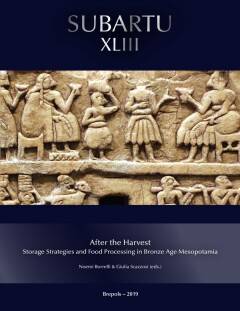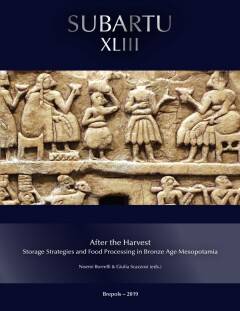
Door een staking bij bpost kan je online bestelling op dit moment iets langer onderweg zijn dan voorzien. Dringend iets nodig? Onze winkels ontvangen jou met open armen!
- Afhalen na 1 uur in een winkel met voorraad
- Gratis thuislevering in België vanaf € 30
- Ruim aanbod met 7 miljoen producten
Door een staking bij bpost kan je online bestelling op dit moment iets langer onderweg zijn dan voorzien. Dringend iets nodig? Onze winkels ontvangen jou met open armen!
- Afhalen na 1 uur in een winkel met voorraad
- Gratis thuislevering in België vanaf € 30
- Ruim aanbod met 7 miljoen producten
Zoeken
After the Harvest
Storage Practices and Food Processing in Bronze Age Mesopotamia
Noemi Borrelli
Paperback | Engels
€ 84,80
+ 169 punten
Omschrijving
The reliance on grain and grain products is a key feature of many past societies, and this is particularly true of the Ancient Near East. The necessity of storing and processing foodstuffs encompassed political and social boundaries: food shaped identities and it was not by chance that, for the Mesopotamian mindset, civilization started with the consumption of bread and beer. At any managerial level, storage practices and food processing reflect the economic organization of a society, its control mechanisms, and its interdependent social structures. This volume includes eight papers by scholars of the Ancient Near East, who draw on a wide range of sources and methodologies, from (bio-)archaeological evidence to cuneiform texts, in order to explore what actually happened after the harvest in the shared horizon of Bronze Age Mesopotamia. The different case-studies gathered together here examine the impact of continuity - and crucially, of change - in the technical, economic, and social solutions that were adopted by people in response to the common needs of everyday life. This volume represents a dialogue between different perspectives and disciplines that simultaneously opens up new paths of research, at the same time as seeking to narrow the gaps in our understanding of this subject.
Specificaties
Betrokkenen
- Auteur(s):
- Uitgeverij:
Inhoud
- Aantal bladzijden:
- 146
- Taal:
- Engels
Eigenschappen
- Productcode (EAN):
- 9782503583785
- Verschijningsdatum:
- 5/03/2020
- Uitvoering:
- Paperback
- Formaat:
- Trade paperback (VS)
- Afmetingen:
- 216 mm x 277 mm
- Gewicht:
- 698 g

Alleen bij Standaard Boekhandel
+ 169 punten op je klantenkaart van Standaard Boekhandel
Beoordelingen
We publiceren alleen reviews die voldoen aan de voorwaarden voor reviews. Bekijk onze voorwaarden voor reviews.











